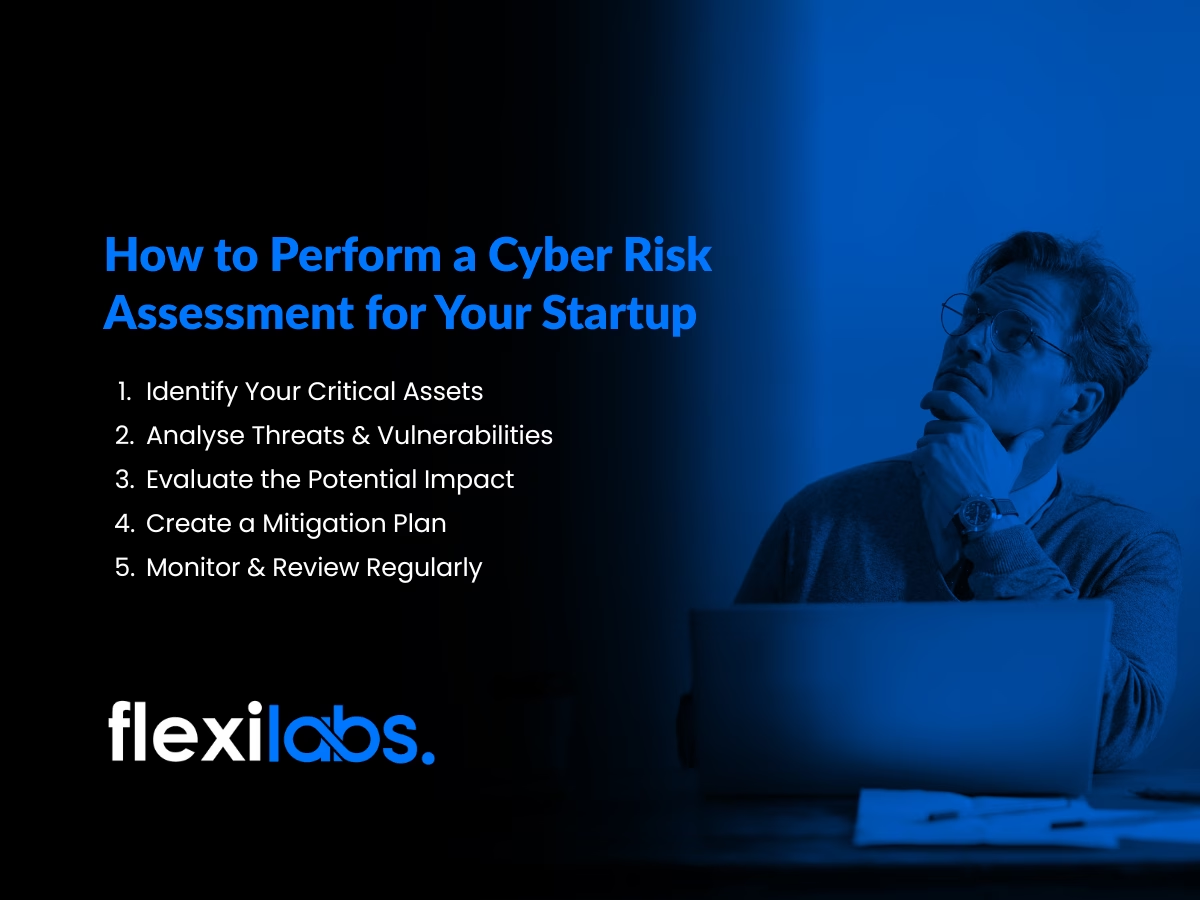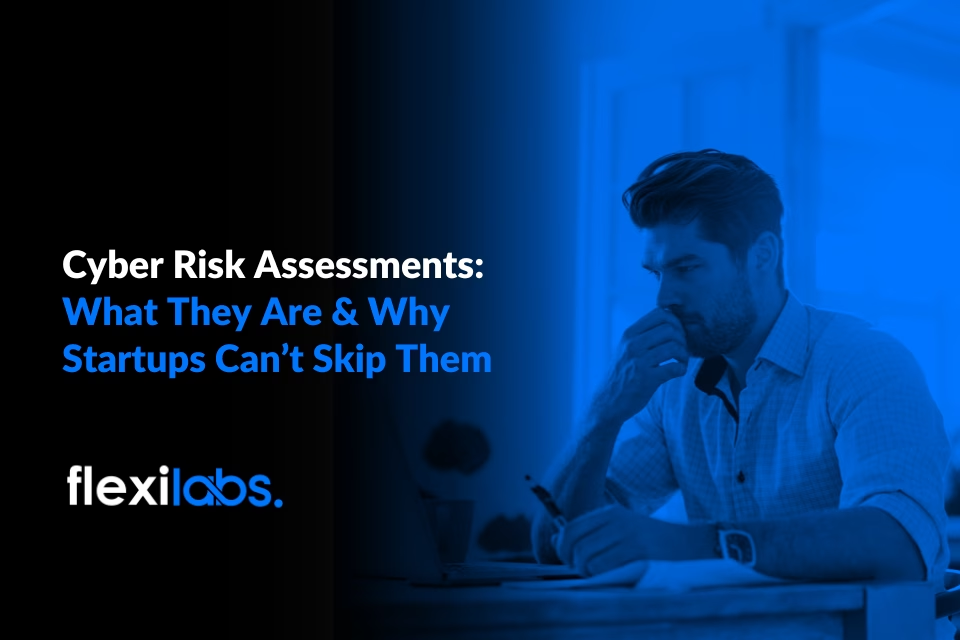Running a startup comes with plenty of excitement, but it also brings its fair share of risks. One of the biggest and most overlooked risks is a cyber threat. A single breach can damage your reputation, cost you money, and lose customer trust. This blog will help you understand why a cyber risk assessment is one of the best investments you can make early on.
What Is a Cyber Risk Assessment?
A cyber risk assessment is a process that helps businesses identify potential security threats before they become real problems. It involves reviewing your systems, software, data storage, and internal processes to find weaknesses. Once you know where the gaps are, you can make a plan to fix them. This approach helps protect your startup from common threats like hacking, phishing, and data leaks.
It’s not just about technology—it’s also about people, habits, and how you handle information day to day. A good assessment takes a big-picture view of how your startup works and what assets need protection. Whether you are storing customer data or running cloud-based systems, knowing your risks helps you stay one step ahead. It’s the foundation of smart, secure decision-making.
Why Are Startups More Vulnerable to Cyber Risk?
Startups often prioritise growth over security, making them easy targets. Challenges startups face include relying on basic tools and systems that are quick to set up but not always secure. This can leave sensitive data exposed to cybercriminals who know exactly where to look. It is not a question of if a threat will come, but when.
Budgets are usually tight, which means security may not seem like a top priority. But the cost of fixing a breach is often much higher than preventing one. Without a plan in place, even a small attack can disrupt operations and damage your brand. It is always more efficient to build security into your business from the start.
Another common issue is the fast pace of change. Startups grow quickly, adding new tools, platforms, and people all the time. Keeping up with cybersecurity innovations alongside these changes is important for managing new risks. A cyber risk assessment helps you stay in control as your startup grows.
Benefits of Conducting a Cyber Risk Assessment for Startups
Knowing your cyber risks early can save your startup from costly mistakes and disruptions. A cyber risk assessment helps you protect your business, build trust, and make smarter decisions for growth.

1. Find Weaknesses Before Attackers Do
An assessment helps you see where your systems are most at risk. It reveals vulnerabilities that you might not have noticed during day-to-day operations. From outdated software to misconfigured settings, small issues can turn into big problems. Catching them early means you can fix them fast and avoid major damage.
2. Make Smarter Business Decisions
When you understand your risks, you can plan more effectively. You will know where to invest your time and budget for the biggest impact. A clear view of your security posture also helps guide your hiring and tech choices. It turns guesswork into strategy.
3. Build Trust With Clients & Investors
People want to work with businesses they know will protect their information. Showing that you take cyber risks seriously adds credibility. It is a strong signal to clients, partners, and potential investors. A little transparency about your efforts goes a long way.
4. Avoid Unnecessary Costs & Downtime
Cyberattacks can shut down your operations and lead to expensive recovery work. With a risk assessment, you can prevent many of these issues before they start. It is a proactive way to save money, time, and stress. Prevention is always cheaper than the cure.
5. Stay Compliant With Data Protection Laws
Different regions have different rules around data privacy and cybersecurity. A good assessment keeps you aligned with the relevant standards. This helps avoid legal issues and builds confidence with users. Compliance is not just a checkbox—it is part of good business practice.
How to Perform a Cyber Risk Assessment for Your Startup
Cyber threats can hit small businesses just as hard as large corporations—and sometimes harder. A clear, step-by-step risk assessment can be the difference between a minor setback and a major disaster.

1. Identify Your Critical Assets
Start by listing the systems, data, and tools your business relies on. These are the things you need to protect most. Think about customer records, internal tools, communication channels, and financial data. Knowing what is important makes it easier to secure.
2. Analyse Threats & Vulnerabilities
Look at both external threats like hacking and internal risks like human error. Consider what could go wrong and how likely it is. You do not need to imagine every possible event—just focus on the realistic ones. This step helps you stay grounded while planning ahead.
3. Evaluate the Potential Impact
Not all risks are equal. Some could cause a minor inconvenience, while others could shut your business down. Rate each risk based on how serious the consequences would be. This makes it easier to prioritise what to address first.
4. Create a Mitigation Plan
Once you know your biggest risks, decide what to do about them. This might mean updating your software, setting stronger passwords, or providing staff training. The goal is to reduce risk in a way that fits your resources. You do not need perfection—just progress.
5. Monitor & Review Regularly
Cyber risks change as your business grows and technology evolves. Set a schedule to check your systems and update your plans. A once-a-year review is a great start, but you may need to do it more often. Staying consistent helps you stay protected.
How Often Should a Startup Conduct a Cyber Risk Assessment?
It’s best to do your first cyber risk assessment as early as possible. This gives you a strong foundation and helps shape future decisions. Even a basic check can uncover important insights. You do not need to be a big company to take security seriously.
After that, review your risks whenever there is a major change in your business. New tools, product launches, team expansions, or market changes can introduce new vulnerabilities. Make risk assessments part of your regular routine. This helps keep your defences strong and up to date.
Tips for Startups Getting Started with Cyber Risk Assessments
Getting started might feel overwhelming, but you don’t need to do everything at once. Focus on what you can control, then build from there. Even a simple checklist is a great first step toward stronger security.
- Use free or low-cost tools to scan your systems for common vulnerabilities
- Ask a trusted IT expert or consultant to help review your current setup
- Prioritise risks based on what matters most to your business
- Provide basic cyber awareness training to your team
- Back up your data regularly and test recovery options
As you grow, you can expand your efforts and bring in more advanced solutions. The key is to stay consistent and make cyber safety part of your company culture.
Final Thoughts
Startups often have big goals, but even the best ideas can fall apart without the right protection. A cyber risk assessment isn’t just for big companies or tech experts. It’s a smart, practical way to safeguard your business and future-proof your success.
You don’t need a huge budget or a full IT team to get started. All you need is the willingness to take that first step. Understanding your risks and planning ahead will save you from bigger problems down the line. Make cyber safety a priority before it becomes a problem.
Worried about cyber threats catching your startup off guard? Contact us today to get started on your cyber risk assessment and secure your business’s future.









